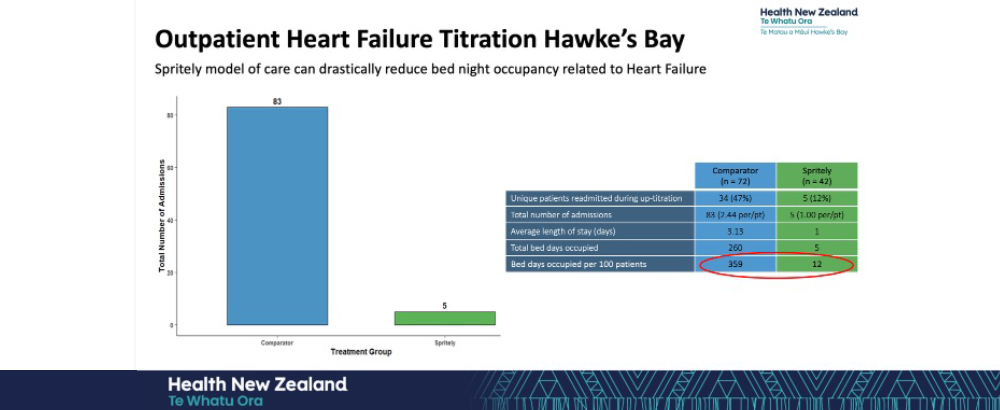
blog detail

September 3, 2025
Telemonitoring
Heart failure remains one of the leading causes of hospital admissions and readmissions across New Zealand particularly for older adults. The condition affects a significant portion of the population, with prevalence increasing with age and being disproportionately higher among Māori and Pacific peoples.
Patients living with heart failure often experience frequent hospital stays as their medications are carefully adjusted over time to strengthen their heart and manage symptoms. Each readmission takes a toll not just on patients and their whānau, but also on already stretched hospital resources.
That’s why these recent results from the Hawke’s Bay cardiology team are so exciting. Their data shows that when they manage up-titration for HF patients using the Spritely platform it dramatically reduces readmissions and hospital bed days compared to standard care.
Here’s what the numbers say:
These outcomes are not just numbers on a page—they translate into stronger hearts, fewer disruptions to patients’ lives, and huge relief for the hospital system.
The difference lies in how care is delivered. Traditionally, up-titration (gradually increasing heart failure medications to the right dose) is slow and clinic-based. Patients often wait weeks between reviews, meaning opportunities to optimise treatment are lost and many end up back in hospital.
Data shows that patients managed on the Spritely platform reach target or maximally tolerated doses up to six times faster than with standard care. This accelerated titration has a direct, measurable impact - patients are less likely to be readmitted and far fewer hospital bed nights are consumed.
Spritely achieves this through a uniquely efficient model that blends remote monitoring, telehealth, and patient support. Our fully managed device kit goes beyond a simple blood pressure cuff, providing patients with tailored education, guided check-ins, reminders, messaging, and video calls. For clinicians, Spritely delivers real-time data, risk alerts, and daily visibility into how patients are doing at home, enabling earlier interventions and safer, faster treatment adjustments.
Instead of waiting for the next clinic appointment - or worse, a hospitalisation - nurses and doctors can act proactively. This keeps patients safer, helps their hearts recover sooner, and dramatically reduces avoidable admissions.
The results in Hawke’s Bay show what’s possible: with Spritely, patients spend less time in hospital, the system saves precious bed days, and outcomes improve across the board.
For a health system under constant strain, Spritely isn’t just another digital tool - it’s a proven, smarter way forward for heart failure care.

September 3, 2025